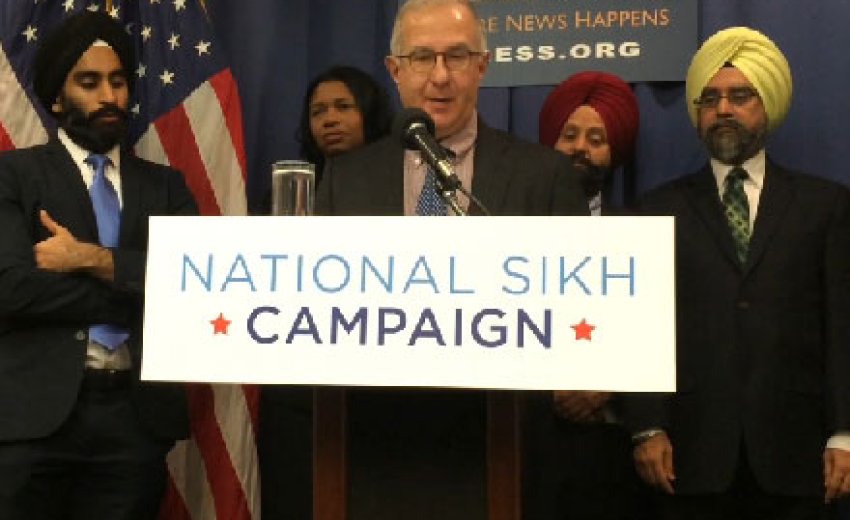January 27, 2015
PRESS RELEASE
National Sikh Campaign and Hart Research release landmark study on Sikhism in America
Research finds that a majority of Americans know nothing at all about Sikhism and some admit wariness when seeing their Sikh neighbors. Yet after learning about the strong parallels between Sikh values and American values – especially equality – participants’ attitudes dramatically shift towards the positive, showing how American attitudes have the potential to change.
Washington, D.C. – Although Sikhism is the world’s fifth largest organized religion, with more than half a million Sikhs living in the United States since the 19th century, a majority of Americans are unaware of what Sikhism is or what a Sikh looks like. However, a study conducted by Hart Research Associates shows that there is enormous potential to increase awareness and enhance positive sentiments toward Sikhism within the broader American public. In particular, greater understanding can be achieved by sharing information that emphasizes Sikhism’s belief in equality regardless of gender, race, or religion, highlighting the strong parallels between Sikh values and American values, and explaining the significance of the turban.
The report, “Sikhism in the U.S.: What Americans know and need to know,” was commissioned by the National Sikh Campaign (NSC) to analyze Americans’ current view of Sikhism in the United States, and identify key messages that will increase their recognition and acceptance of Sikh Americans. The study was developed to provide Sikhs a foundation for awareness-based initiatives that dispel the misperceptions that have driven the dramatic rise of hate-based violence against Sikhs since 9/11. The report is the most comprehensive study every conducted on the Sikh-American community.
“This landmark study will help the Sikh community by giving us the ability to educate Americans in a way that is both relatable and effective. It also allows us to see which demographics are most receptive to our messaging as well as those who we need to target the most to prevent misunderstanding. Ultimately, we want to give young Sikhs a future where tying their turban in the morning is not a cause for concern, a future where people in general will understand that they’re tying a symbol of respect – not an object of inevitable discrimination,” said Gurwin Singh Ahuja, Co-Founder of NSC.
“We want to make sure that we pave a way for a conducive environment for our future generations so they don’t have to take off their turban to hide or to feel sorry for their identity,” said Rajwant Singh, a co-founder of theNational Sikh Campaign, at a news conference Monday (Jan. 26) at the National Press Club.
"We have been very much part of the American fabric, and yet we are not well known, and often misunderstood," said Rajwant Singh, co-founder and senior adviser of the National Sikh Campaign. "Frankly speaking, we are just tired of being the target and we want to be understood."
“We hold incredibly progressive values,” said Gurwin Singh Ahuja, another co-founder of the National Sikh Campaign. “Sikhs believe that men and women are equal, that all faiths should have the right to practice, and we have to do a better job of communicating those things.”
Researchers found that when survey respondents were given information about Sikh history and beliefs, their impressions grew from “neutral” to “warm.” Groups with the most significant change in views included Republicans, Hispanics and Americans ages 65 and older.
“When people learn this information, it creates a fundamental change in the way they think about Sikhs and it’s transformative,” said Geoff Garin, president of Washington-based Hart Research Associates, whose survey was conducted in August and September 2014.
Joshua DuBois, former faith outreach adviser to President Obama, joined other Christian and Jewish leaders at the announcement of the campaign and recalled traveling to Oak Creek with first lady Michelle Obama.
“Sikhs are beautiful threads in the tapestry of this country,” said DuBois, the founder and CEO of Values Partnerships, citing their contributions to the U.S. military, the medical community and youth service projects. “I’ve seen what happens when we don’t know the Sikh story,” he added. “I‘ve seen firsthand what happens when ignorance and bigotry reigns. But a new day is dawning in America because we’re finally getting to know our Sikh brothers and sisters.”This qualitative and quantitative study included information from three focus groups consisting of white Americans with mixed levels of education, as well as a nationwide survey of 1,144 non-Asian Americans that was conducted in August and September of 2014. The study built on previous research findings that brought to light the pervasiveness of subconscious and emotionally charged biases against Sikh symbols of faith, including the turban and beard.
“We hope that this in-depth review of the research’s findings provides clarity on Americans’ current knowledge of Sikhism as well as a clear direction for how Sikh Americans can most effectively communicate their beliefs with the larger public in order to tell their story in the most compelling terms,” said Geoff Garin, President of Hart Research and renown political strategist.
Here are some key takeaways from the findings:
- Most Americans have no knowledge of the religion. Many Americans have never heard of the religion and only 11% of Americans have a personal acquaintance or friend who is Sikh. The majority of Americans (60%) admit to knowing nothing at all about Sikh Americans and knowledge of Sikhism is substantially lower than for other minority religious groups in the United States; whereas only 40% of Americans say they know at least something about Sikh Americans, 62%, 76%, and 86% know something about Hindu Americans, Muslim Americans, and Jewish Americans, respectively.
- With unawareness levels so high, many Americans make false assumptions when they see a Sikh. When shown a photo of a male Sikh wearing a turban, very few Americans volunteer that they recognize him as a Sikh (11%). Far more believe that the person is Muslim (20%), Hindu (13%), or Middle Eastern (28%).
- While this lack of knowledge is a challenge, it also represents an enormous opportunity. Without much knowledge to form attitudes, most Americans rate their feelings toward Sikh Americans as generally neutral or non-existent. However, after reading about Sikh history and beliefs as well as a series of messages about Sikhs, warm feelings toward Sikh Americans increased substantially. By the end of the survey, a large portion of Americans moved from feeling neutral (mean = 54.1 on a 0-100 scale) to warm (mean = 71.6, an increase of 17.5 points). One of the most encouraging findings is that some of the most initially challenging audiences are also among those who exhibit the largest increases, such as Americans ages 65 and older (+21.9), Republicans (+21.7), and Hispanics (+21.4).
- Sikhs must tell their American story in familiar and positive terms, highlighting the value of equality.
The tenet of Sikhism that resonated most with the broader American public was the belief that all men and women are created equal. The Sikh faith supports the right to “life, liberty and pursuit of happiness,” which sets the foundation for effective communication and knowledge sharing. More than half of Americans felt that the value of equality was one of the most important messages American Sikhs could share and specifically stood out to them. - For Millennials and other receptive audiences, explaining the significance of the turban is highly welcomed. The turban is most commonly associated with Sikh Americans, however it is also what makes many Americans uneasy around Sikhs. Research shows that younger Americans, Democrats, and those living in the western United States, are receptive to descriptions of the Sikh turban as an expression of Sikh (and hence, American) values. The turban signals a Sikh’s readiness to protect all people against injustice, regardless of faith, gender, caste, or color.
http://www.dailymail.co.uk/wires/afp/article-2927545/Americans-confusing-Sikhs-Muslims.html
http://medillonthehill.net/2015/01/sikhism-in-the-u-s-what-americans-need-to-know/
http://www.nbcnews.com/news/asian-america/new-study-reveals-most-americans-dont-understand-sikhism-n293576
http://national.deseretnews.com/article/3371/Most-Americans-are-clueless-about-Sikhs.html
About National Sikh Campaign
The National Sikh Campaign is a 501(c)(3) nonprofit organization that is helping to build the image of Sikhism in America and highlight the impact Sikh Americans have made in the United States. The aim of this campaign is to create an environment of mutual acceptance in which Sikhs don’t have to hide their articles of faith and lay the foundation for more Sikh Americans to become leaders in the United States.
NSC will use this research to raise understanding of Sikhism, change the perceptions of Sikhs in America and organize the Sikh community. It will also lay the backbone for future initiatives that include a data-driven, grassroots awareness effort that will employ web and digital advertisements, TV advertising, and broadcast and national media. NSC is reaching to various Gurdwaras, Sikh organizations, and stakeholders within America and internationally to create the largest network of Sikhs and the most influential PR effort ever for Sikhism.
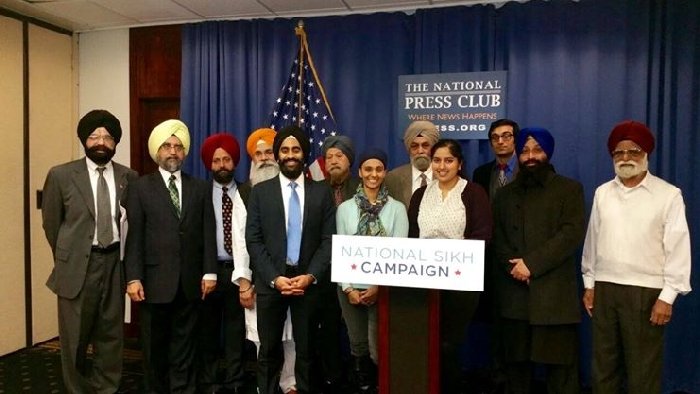 |
| Left to right: Joshua Dubois, President Obama's Former head of the White House Faith Office , Dr. Rajwant Singh, Shawn Ghuman, and Paul Monteiro, Former Associate Director of White House Office of Public Engagement. |
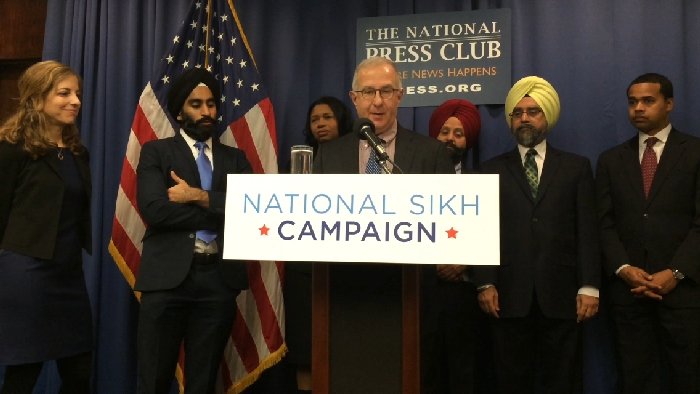 |
| Geoffrey Garrin Presenting the report |
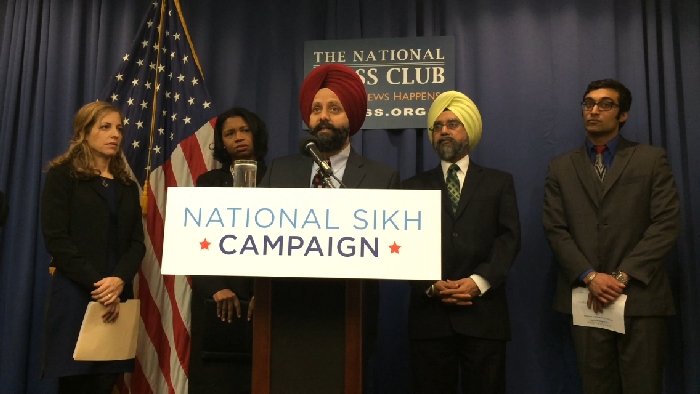 |
| Rana Sodhi speaking at the Press conference |
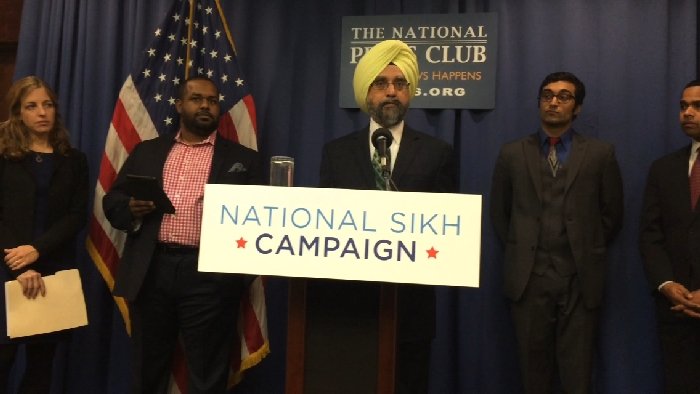 |
| Sikh attendees of the Press conference |
